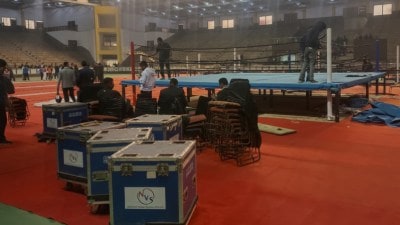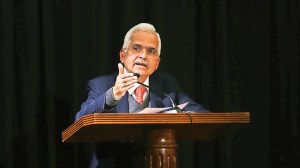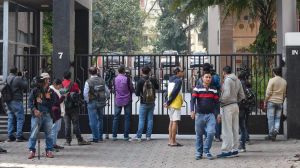Tailed in Islamabad
The complexities of Pakistan, and the contradictions of living as an Indian there

Dateline Islamabad
Amit Baruah
Penguin, Rs 295
Amit baruah was the Islamabad correspondent for The Hindu newspaper from 1997 to 2000. Dateline Islamabad, his account of those years, is interesting, not least because his assignment gave him a rare look at Pakistan. Bilateral protocol allows very few Indian journalists to be based in or to report from Pakistan. This is why his account is more than an ordinary reporter8217;s diary; sometimes expressly and often inadvertently, his writing is deepened by the parallel narrative of being an Indian in Pakistan.
Through the book, Baruah tries to drive home three points: one, Pakistan is a paranoid state with great people; two, there is a hegemonic omnipresence and omnipotence of the army; and lastly, yet most interestingly, what it means to be an Indian in Pakistan.
8220;Great people, paranoid state8221;, the first chapter, could have served as an alternate title for the book. Being one of two Indian reporters allowed to be based in Pakistan Benazir Bhutto reduced the number from four to two, and India reciprocated, he had an 8220;escorted8221; existence and the intelligence agencies ensured that he and his family were 8220;never alone8221;. There are many humorous anecdotes, like a motorbike-borne sleuth who had to tail Baruah 8212; on his bicycle 8212; at a snail8217;s pace. His restricted visa allowed him limited access to the country and Baruah categorically laments not being able to report Kargil and Kandahar. Juxtaposed against these grudges is his affection for the friends he made there, substantiated by his mention of those friends kept anonymous for the sake of their security. 8220;Assignment Islamabad8221; was a 8220;daunting task8221;.
The book is dotted with instances of a point cardinal to the way strings are pulled in Pakistan: 8220;In order to have the right type of elite connections, at least one member of the family had links with the military. This was essential, like an insurance policy.8221; One senses Baruah8217;s observation of the army being a self-proclaimed custodian of the country when he says, 8220;the army intervenes when it feels the country needs it8221;. His friends shocked him when they said coups were a simple affair in their country; a jeep from the 111 Brigade drove from Rawalpindi to Islamabad, and Pakistan passed from civilian to military hands! The Fauj, he says, is a permanent pillar of the establishment, with its ancillaries like the Fauji Foundation being the largest private-sector employer of the country. Baruah says then prime minister Nawaz Sharif helped make the army all-pervasive and his government weak. It was called in to dispense justice, conduct the census and build roads.
Dateline Islamabad carries ample accounts of then army chief Pervez Musharraf8217;s disdain for Sharif. He writes at length about how Musharraf kept Sharif in the dark regarding the Kargil operation. The Lahore Summit, which happened just before Kargil, according to Baruah, failed because of India8217;s failure to reach out to both the civilian and military leadership of Pakistan.
Surprises never eluded Baruah during his stay in Pakistan. His narration of Lashkar-e-Taiba chief Hafiz Muhammad Saeed moving about freely in Islamabad with a government number plate on his car is chilling.
The book ends on an interesting note: America is said to be a 8220;referee8221; between India and Pakistan. Baruah draws three major inferences at the end. The litmus test for Musharraf8217;s sincerity towards India will be the treatment meted out to Pakistan-based militant groups. Secondly, Kashmir remains pivotal to Pakistan8217;s agenda. Finally, the fundamental forces in both the countries continue to be the perpetual threat to their relations.
- 01
- 02
- 03
- 04
- 05































